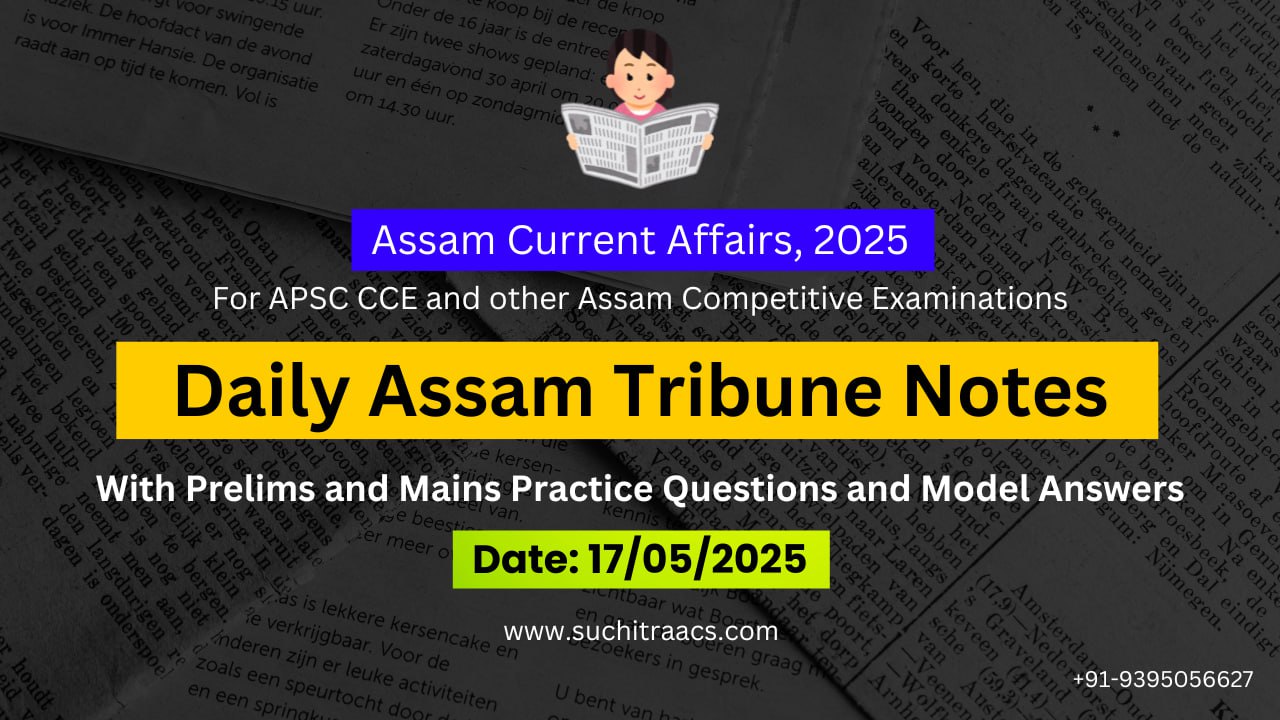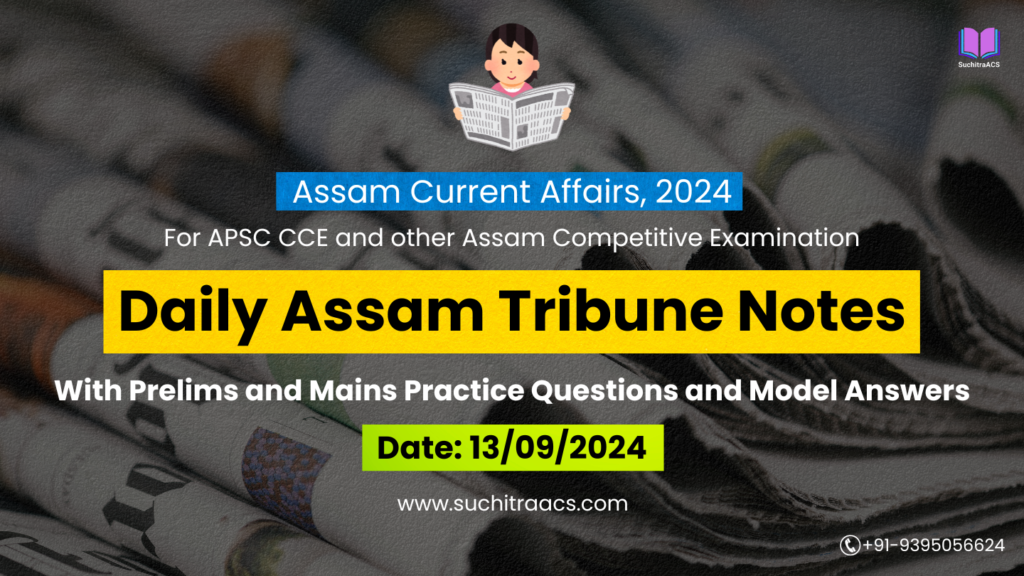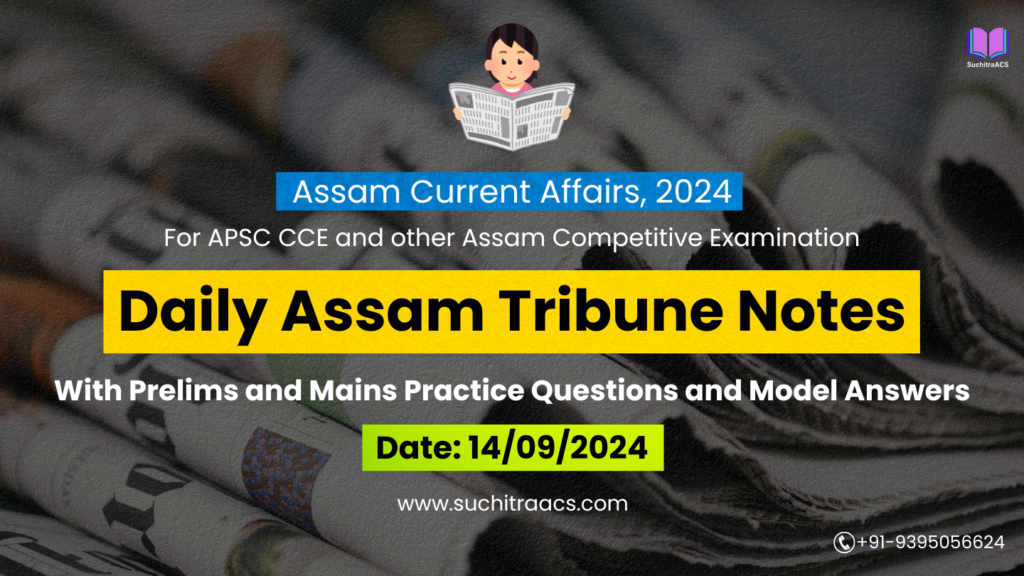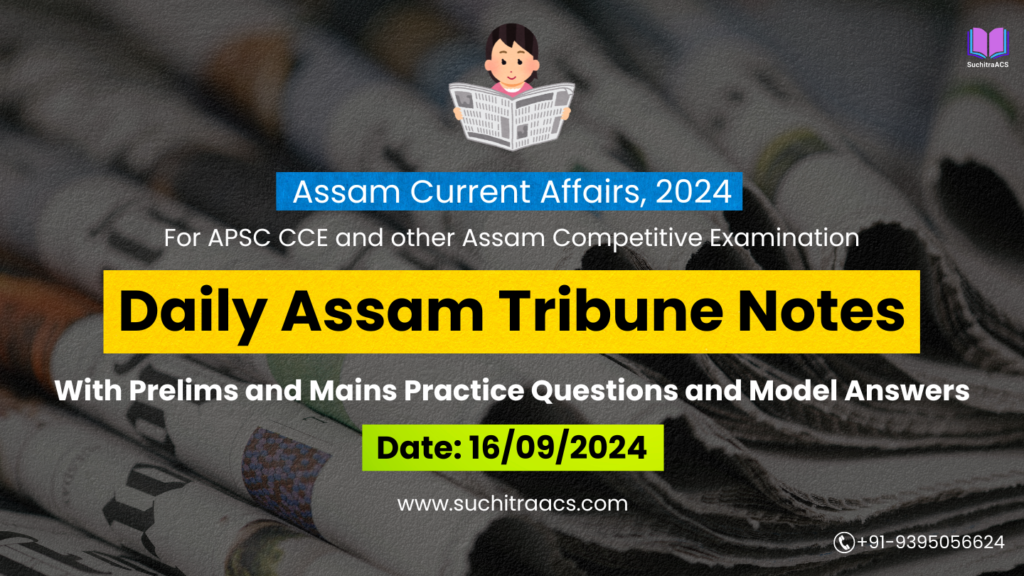APSC Current Affairs: Assam Tribune Notes with MCQs and Answer Writing (16/05/2025)
For APSC CCE and other Assam Competitive examinations aspirants, staying updated with current affairs is vital. This blog covers most important topics from the Assam Tribune today (16-05-2025). These issues are key for both APSC Prelims and Mains preparation, offering insights into the APSC CCE Syllabus.
✨ Current Affairs Crash Course for the APSC Prelims 2025

🟢 Topic: Assam Notifies Comprehensive Policy to Combat Human Trafficking and Witch-Hunting
📘 GS Paper 2 (Polity & Governance): Vulnerable Sections | Government Policies
📘 GS Paper 1 (Society): Social Issues | Women and Tribal Rights
📘 GS Paper 5 (APSC): Assam-specific Governance | Social Justice
🔹 Introduction
In a landmark move, the Assam government has notified a State Policy to Combat Human Trafficking and End Witch-Hunting. The policy aims to build an institutional, victim-centric, and community-driven response to two deeply rooted social evils. Assam is among the worst-affected states in India for both issues, necessitating such a multi-sectoral and rights-based framework.
🔑 Key Features of the Policy
| Component | Description |
| Notified By | Department of Women and Child Development, Assam |
| Targeted Crimes | Human trafficking and witch-hunting |
| Focus | Victim-centric rehabilitation, legal redress, awareness, prevention |
| Support Services | Safe housing, trauma counselling, education, vocational training |
| Legal Provisions | Special courts, victim-witness protection, asset seizure from perpetrators |
| Coordination Mechanism | Committees at state, district, and village levels under Mission Shakti |
| Geographical Focus | Trafficking-prone border districts; tribal areas affected by witch-hunting |
| Budgetary Provision | Dedicated budget head and social audits |
| Implementation Partners | SHGs, VDPs, schools, civil society, local governments |
⚙️ Prelims Pointers
Assam Witch Hunting (Prohibition, Prevention, and Protection) Act, 2018: Penalizes branding someone a witch; punishable with life imprisonment.
Mission Shakti: Centrally sponsored scheme for safety, security, and empowerment of women.
Human Trafficking Hotspots in Assam: Dhubri, Kokrajhar, Baksa, Karimganj—border districts.
One Stop Centres: Provide integrated support for women facing violence.
UN Palermo Protocol: International agreement to prevent, suppress and punish trafficking in persons.
📝 Mains Pointers
A. Significance of the Policy
Holistic Approach: Shifts the focus from just law enforcement to prevention and rehabilitation.
Border State Strategy: Assam’s proximity to international borders (Bangladesh, Bhutan) makes this critical.
Restorative Justice: Focus on rebuilding the lives of victims rather than punitive measures alone.
Cultural Sensitivity: Addresses belief-based violence like witch-hunting with awareness and education.
First in India: Assam becomes one of the few states with an integrated trafficking + witch-hunting policy.
B. Challenges in Implementation
| Challenge | Details |
| Underreporting | Due to stigma, threats, and fear of retaliation |
| Lack of Awareness | Superstitions and poverty perpetuate witch-branding |
| Cross-border Dynamics | Traffickers use porous borders to evade law |
| Resource Constraints | Shelters, trained counsellors, legal aid are inadequate |
| Inter-departmental Gaps | Effective coordination among 12+ departments is difficult |
C. Government Initiatives & Convergence
Mission Vatsalya: Focuses on care and protection of children.
Orunodoi Scheme: Can provide direct income support to rescued women.
Shakti Sadans: Shelter homes for rescued women.
Special Courts & Asset Seizure: Proceeds of crime used for victim support.
Annual Social Audits: Monitor policy impact and plug institutional gaps.
D. Way Forward
Mass Awareness Campaigns: Use folk theatre, radio, school curricula to tackle superstition.
Border Surveillance Tech: Biometric verification, AI in child rescue operations.
Community Paralegals & Social Workers: Create support cells in tribal and remote belts.
NGO-Govt Collaboration: Leverage CSO expertise in rehabilitation and tracing missing persons.
Evaluation Mechanisms: Real-time tracking of FIRs, survivor status, and court cases.
📚 Relevant Legal & Policy Framework
Indian Penal Code (IPC) Sections 370 & 374 – Address human trafficking
Protection of Children from Sexual Offences Act (POCSO)
Juvenile Justice (Care & Protection) Act, 2015
Assam Witch-Hunting Act, 2018
UN SDGs – Goal 5 (Gender Equality), Goal 16 (Peace & Justice)
🧩 Conclusion
By integrating protection, prevention, prosecution, and rehabilitation, Assam’s new policy represents a paradigm shift in addressing systemic social violence. Success will depend on execution at the grassroots, civil society engagement, and robust monitoring to break the cycle of abuse and silence.
🟢 Topic: 5G Services Launched in Assam’s Border Town of Dhubri
📘 GS Paper 3: Science & Technology | ICT for Development
📘 GS Paper 2: E-Governance | Digital Inclusion
📘 APSC GS Paper 5: Assam-specific Infrastructure & Border Area Development
🔹 Introduction
In a move to strengthen digital connectivity in remote and border areas, 5G services were officially launched in Dhubri, a key border town in Assam. The initiative is part of the Centre’s broader strategy to bridge the digital divide, promote smart border security, and boost socio-economic development in under-served regions.
🔑 Key Points
| Feature | Details |
| Launched In | Dhubri, Assam – bordering Bangladesh |
| Telecom Partner | BSNL and private telcos (Airtel, Jio in PPP model) |
| Technology Rolled Out | Standalone 5G (SA-5G) with high bandwidth for public services |
| Strategic Purpose | Surveillance, border management, education, telemedicine |
| Target Beneficiaries | Farmers, students, traders, border security forces |
| Supporting Infra | BharatNet fibre rollout + 5G towers under USOF (Universal Service Obligation Fund) |
⚙️ Prelims Pointers
5G Technology: Offers ultra-low latency (<1 ms), higher bandwidth, and enables AI/IoT applications.
SA-5G vs NSA-5G: Standalone 5G (SA) does not rely on 4G infrastructure; Non-Standalone (NSA) uses 4G base.
BharatNet Project: Aims to provide high-speed broadband to all gram panchayats in India.
USOF: Government fund to support telecom expansion in remote and economically unviable areas.
Dhubri District: High strategic importance—located on the Indo-Bangladesh border with porous terrain.
📝 Mains Pointers
A. Significance of 5G in Border Regions
Smart Surveillance: Enables deployment of AI-powered drones and CCTVs for border monitoring.
Education Inclusion: Facilitates digital classrooms in schools with real-time streaming and content access.
Telemedicine Boost: Doctors in Guwahati or Delhi can now guide remote surgeries via 5G telepresence.
Agritech & Weather Data: Farmers receive instant data on soil, rainfall, and crop patterns.
Digital Governance: Enables real-time service delivery, grievance redressal, and biometric verification.
B. Challenges in Implementation
| Challenge | Explanation |
| Power Supply Issues | Unreliable electricity hinders 5G base station operation |
| Terrain Difficulties | Riverine and forested terrain make tower installation difficult |
| Cybersecurity Concerns | Cross-border interference, digital snooping risks |
| Affordability Gap | 5G-enabled devices and data plans still costly for poor households |
| Digital Literacy | Lack of awareness and digital skills among rural youth and elderly |
C. Policy & Government Measures
Digital India Programme: Promotes access to digital infrastructure and services
Border Area Development Programme (BADP): Infrastructure and livelihood focus in sensitive border belts
PM Gati Shakti Mission: Integrates digital infra in overall connectivity planning
AI for All Strategy: 5G supports deployment of AI in agriculture, healthcare, and policing
Assam’s Broadband Mission: Local push for last-mile fibre-to-home and mobile access in char (island) areas
D. Way Forward
Community Digital Resource Centres: Shared 5G-powered kiosks for training, banking, and services
Green Power Solutions: Use of solar backups for tower resilience
Affordable Devices Initiative: Subsidized smartphones via SHGs and panchayats
Local Language Content: Make digital content available in Assamese and tribal dialects
Cybersecurity Training for Border Forces: Equip local police with digital vigilance tools
📚 Relevant Schemes & Reports
National Digital Communications Policy (2018)
National Broadband Mission
TRAI’s 5G Roadmap for India (2022)
SDG 9: Industry, Innovation, and Infrastructure
Assam IT & Electronics Policy 2022
🧩 Conclusion
The rollout of 5G in Dhubri is a significant step toward digital sovereignty and inclusive governance in Assam’s strategic periphery. When aligned with local capacity-building, it can transform the border economy, governance, and security landscape of Northeast India.
🟢 Topic: India Gifts Warship INS Kirpan to Vietnam: Expanding Maritime Diplomacy
📘 GS Paper 2: International Relations | India’s Neighbourhood Policy | Indo-Pacific Strategy
📘 GS Paper 3: Security | Maritime Security | Defense Cooperation
📘 APSC GS Paper 5: India’s Act East Policy & Strategic Engagement with ASEAN
🔹 Introduction
India has formally transferred INS Kirpan, a decommissioned but fully functional Khukri-class corvette, to the Vietnam People’s Navy. This act of defense diplomacy marks a significant step in strengthening India’s strategic partnership with Vietnam and enhancing maritime security cooperation in the Indo-Pacific region, particularly amid growing Chinese assertiveness in the South China Sea.
🔑 Key Points
| Feature | Details |
| Ship Name | INS Kirpan (P44), Khukri-class missile corvette |
| Recipient | Vietnam People’s Navy |
| Transfer Date | May 2025 (ceremony held in Cam Ranh Bay, Vietnam) |
| Purpose | Capacity building, naval partnership, deterrence in Indo-Pacific |
| Donor Nation | Indian Navy (via Ministry of Defence) |
| Strategic Context | China’s aggressive posturing in South China Sea; India-Vietnam counterbalancing |
| Diplomatic Framework | Comprehensive Strategic Partnership (India–Vietnam, since 2016) |
⚙️ Prelims Pointers
INS Kirpan: Commissioned in 1991, part of Indian Navy’s Khukri-class corvettes, designed for coastal patrol and missile warfare.
South China Sea Dispute: Involves overlapping territorial claims by China, Vietnam, Philippines, Malaysia, etc.
Cam Ranh Bay: Strategic deep-water port in Vietnam; used by India for naval maintenance.
Act East Policy: India’s diplomatic and economic engagement with Southeast Asia, succeeding the Look East Policy.
Indo-Pacific Oceans Initiative (IPOI): India’s multilateral maritime strategy for regional stability and connectivity.
📝 Mains Pointers
A. Strategic Significance of Gifting INS Kirpan
Defense Diplomacy Tool: Strengthens naval ties without permanent basing or large financial outlay.
Countering Chinese Expansionism: Enhances Vietnam’s deterrence capabilities in South China Sea.
Boosts India’s Image as Net Security Provider: Promotes rules-based maritime order.
Capacity Building: Offers training, maintenance support, and interoperability experience.
Supports ASEAN Maritime Unity: Reinforces India’s alignment with ASEAN principles of free navigation.
B. India–Vietnam Strategic Convergence
| Area | Joint Focus |
| Defense & Security | Joint naval exercises, submarine training, radar network development |
| Energy Cooperation | Indian companies exploring oil in Vietnamese EEZ (despite Chinese protest) |
| Capacity Building | Scholarships, military training, IT infrastructure development |
| Digital & Cybersecurity | Recent MoUs on cyber cooperation and secure communications |
| Act East-South China Sea Nexus | India supports freedom of navigation; opposes Chinese maritime claims |
C. Challenges & Constraints
| Challenge | Explanation |
| Chinese Reaction | Beijing opposes Indian involvement in the South China Sea |
| Vietnam’s Military Capacity | Requires sustained logistics and technical support |
| Limited Naval Resources | India’s ability to supply platforms is constrained |
| ASEAN Balancing Act | Vietnam must avoid overdependence on any one external power |
D. Way Forward
Expanded Naval Assistance: Regular training, spare parts, and technical exchange programs
Quad-ASEAN Maritime Linkages: Build synergy between Quad efforts and ASEAN maritime capacities
Blue Economy Cooperation: Joint projects on fisheries, coastal infrastructure, and marine research
Defense Industrial Partnerships: Involve Vietnam in Make in India defense manufacturing
Joint Humanitarian Missions: Conduct joint HADR (Humanitarian Assistance and Disaster Relief) operations
📚 Relevant Treaties & Frameworks
India–Vietnam Comprehensive Strategic Partnership (2016)
UNCLOS (United Nations Convention on the Law of the Sea) – Basis for India’s support of Vietnam’s maritime claims
Indo-Pacific Oceans Initiative (IPOI)
South China Sea Arbitration Case (2016) – Philippines vs. China (India supports UNCLOS compliance)
🧩 Conclusion
By gifting INS Kirpan to Vietnam, India has signalled its intent to be a proactive maritime partner in Southeast Asia. The move blends defense diplomacy with geopolitical balancing, strengthening regional stability, shared security interests, and India’s Act East vision.
🟢 Topic: North East to Get Its First AIIMS in Assam’s Changsari
📘 GS Paper 2: Health | Government Schemes | Infrastructure
📘 GS Paper 3: Inclusive Development | Human Resource Development
📘 APSC GS Paper 5: Assam-specific Infrastructure | Public Health in the Northeast
🔹 Introduction
Union Minister Sarbananda Sonowal confirmed that AIIMS Guwahati, located at Changsari, will be fully operational by June 2025, making it the first AIIMS in the Northeast. This is a significant step toward improving specialized healthcare and medical education in the region, long burdened by poor health indicators and infrastructure deficits.
🔑 Key Points
| Feature | Details |
| Institution Name | AIIMS Guwahati (at Changsari) |
| Significance | First AIIMS in Northeast India |
| Operational Date | Fully functional by June 2025 |
| Medical Capacity | 750+ bed facility, 100 MBBS seats, 60 nursing seats |
| Connectivity | Located near NH-31 and Guwahati Airport |
| Built Under | Pradhan Mantri Swasthya Suraksha Yojana (PMSSY) |
| Support Services | Telemedicine, trauma care, super-speciality OPDs |
| Associated Colleges | Ties with NEIGRIHMS, GMCH, and regional health institutes |
⚙️ Prelims Pointers
AIIMS (All India Institute of Medical Sciences): Apex autonomous health institution under MoHFW.
PMSSY: Launched in 2003 to correct regional imbalances in tertiary healthcare.
Changsari Location: Situated in Kamrup (Rural), 30 km from Guwahati.
NEIGRIHMS: Shillong-based health institute serving NE region (not an AIIMS).
Health Infrastructure in NE: Among the lowest doctor-to-patient ratios in India.
📝 Mains Pointers
A. Significance of AIIMS in Assam
Regional Equity: Bridges critical healthcare gap in remote Northeast states
Reduced Migration: Patients need not travel to Delhi or Kolkata for super-speciality care
Medical Education Hub: Will attract top talent to Northeast through AIIMS faculty and training
Boost to Research: Opportunity to study region-specific diseases like JE, malaria, anemia
Public Health Backbone: Supports NHM and PM-JAY in tertiary referral services
B. Challenges in Realization
| Challenge | Explanation |
| Staff Recruitment Delays | Shortage of super-specialists and nurses |
| Patient Load Imbalance | Likely to overwhelm OPDs without tiered referral system |
| Last-Mile Connectivity | Hilly states still face long travel hours to reach Changsari |
| Coordination with State Health Depts | Essential for seamless referrals and outreach |
| High Operational Cost | AIIMS model requires sustained central support and autonomy |
C. Opportunities for the Region
Health Tourism: Patients from Bhutan, Bangladesh may also seek care
Digital Health Integration: Tele-ICU, mobile health vans for hill and char areas
Employment Boost: Thousands of jobs in medical, admin, and ancillary sectors
Skill Development: Nursing, radiography, and paramedical training to expand
D. Way Forward
Integrated Referral Network: Link with district hospitals across NE states
Mobile Health Units: Extend AIIMS outreach to tribal and border areas
Ayush Integration: Collaborate with NE traditions and Ayushman Bharat Wellness Centres
Monitoring & Audit: Track infrastructure, patient care, faculty recruitment in real time
Public Awareness Campaigns: Ensure people in remote areas know how to access services
📚 Relevant Schemes & Frameworks
PMSSY: Funds AIIMS and upgradation of existing government medical colleges
Ayushman Bharat – Health & Wellness Centres
National Health Mission (NHM)
NITI Aayog’s Health Index – Tracks state performance
SDG 3: Good Health and Well-being
🧩 Conclusion
The launch of AIIMS Guwahati is a historic milestone for Northeast India, promising to transform the region’s healthcare and medical education landscape. To ensure lasting impact, it must be backed by inclusive policies, technology integration, and local capacity building.
APSC Prelims Practice Questions
✅ Topic 1: Assam Policy on Human Trafficking & Witch-Hunting
Q1. With reference to the Assam Witch Hunting (Prohibition, Prevention and Protection) Act, 2018, consider the following statements:
- It criminalizes branding a person as a witch.
- The Act allows life imprisonment in cases where witch-branding leads to death.
- It applies only in Scheduled Tribal Areas of Assam.
Which of the statements is/are correct?
A. 1 and 2 only
B. 1 and 3 only
C. 2 and 3 only
D. All of the above
✅ Answer: A. 1 and 2 only
Explanation:
- The Act criminalizes witch-branding and provides for life imprisonment if it leads to death.
- It applies throughout Assam, not just in tribal areas.
Q2. Which of the following international conventions deals specifically with human trafficking?
A. Hague Convention
B. Palermo Protocol
C. Basel Convention
D. Kyoto Protocol
✅ Answer: B. Palermo Protocol
Explanation:
The UN Palermo Protocol (2000) supplements the UN Convention Against Transnational Organized Crime and is the primary international instrument to combat human trafficking.
✅ Topic 2: 5G Launch in Dhubri, Assam
Q3. Which of the following technologies are enabled or enhanced by 5G networks?
- Internet of Things (IoT)
- Autonomous vehicles
- Augmented Reality (AR)
- Tele-surgery
Select the correct answer:
A. 1 and 2 only
B. 1, 2 and 3 only
C. 1, 3 and 4 only
D. All of the above
✅ Answer: D. All of the above
Explanation:
- 5G allows low-latency, high-speed connections essential for IoT, AR, tele-surgery, and autonomous vehicles.
Q4. Which of the following statements about the Universal Service Obligation Fund (USOF) is/are correct?
- It is administered by the Ministry of Electronics and IT.
- It aims to provide telecom services in commercially unviable rural and remote areas.
- It is funded by a Universal Access Levy charged from telecom operators.
A. 1 and 2 only
B. 2 and 3 only
C. 1 and 3 only
D. All of the above
✅ Answer: B. 2 and 3 only
Explanation:
- USOF is administered by the Department of Telecommunications, not MeitY.
- Its goal is rural connectivity, funded by a levy on telecom operators.
✅ Topic 3: INS Kirpan Gifted to Vietnam
Q5. INS Kirpan, recently gifted to Vietnam, belongs to which class of warships?
A. Shivalik-class
B. Rajput-class
C. Khukri-class
D. Talwar-class
✅ Answer: C. Khukri-class
Explanation:
INS Kirpan is a Khukri-class missile corvette, decommissioned and gifted to Vietnam in 2025.
Q6. Which of the following are features of India’s Act East Policy?
- Economic integration with Southeast Asia
- Strengthening maritime diplomacy in Indo-Pacific
- Military bases in ASEAN countries
- People-to-people cultural ties
A. 1 and 2 only
B. 1, 2 and 4 only
C. 2 and 3 only
D. All of the above
✅ Answer: B. 1, 2 and 4 only
Explanation:
- India doesn’t maintain military bases in ASEAN nations; hence, statement 3 is incorrect.
✅ Topic 4: AIIMS Guwahati at Changsari
Q7. Which scheme funds the establishment of new AIIMS across India, including AIIMS Guwahati?
A. PM Ayushman Bharat Yojana
B. National Health Mission
C. PM Swasthya Suraksha Yojana
D. Rashtriya Swasthya Bima Yojana
✅ Answer: C. PM Swasthya Suraksha Yojana (PMSSY)
Explanation:
- PMSSY, launched in 2003, funds new AIIMS and upgrades existing medical colleges.
Q8. Which of the following statements about AIIMS Guwahati is/are correct?
- It is the first AIIMS in Northeast India.
- It has started offering MBBS and nursing courses.
- It is operated jointly by the Assam Government and the Union Health Ministry.
A. 1 and 2 only
B. 2 and 3 only
C. 1 and 3 only
D. All of the above
✅ Answer: A. 1 and 2 only
Explanation:
It is the first AIIMS in the Northeast and offers medical and nursing education.
AIIMS Guwahati is autonomous and centrally administered under the Ministry of Health and Family Welfare.
APSC Mains Practice Question
📝 Mains Question:
Q. Discuss the significance of establishing AIIMS Guwahati for improving healthcare and medical education in the Northeast. What challenges need to be addressed to maximize its impact?
(GS Paper 2 – Health & Governance | APSC GS Paper 5 – Assam-specific Infrastructure and Development)
Word Limit: 250
✅ Model Answer:
🔹 Introduction
The establishment of AIIMS Guwahati in Changsari, the first of its kind in Northeast India, marks a turning point in the region’s public health and medical education landscape. Launched under the Pradhan Mantri Swasthya Suraksha Yojana (PMSSY), it reflects the Centre’s commitment to bridging regional healthcare disparities.
🔍 Significance
- Specialized Healthcare Access: Reduces dependence on metro hospitals for cancer, cardiology, neurology, etc.
- Medical Education Hub: Offers 100 MBBS seats and 60 nursing seats, attracting talent to the region.
- Boost to Research: Enables regional disease profiling—e.g., malaria, anemia, JE, and lifestyle diseases.
- Public Health Support: Assists in implementing NHM, PM-JAY, and Ayushman Bharat schemes.
- Employment Generation: Creates thousands of jobs in medical, para-medical, and administrative sectors.
⚠️ Challenges
| Area | Challenges |
| Infrastructure | Delays in residential quarters, road connectivity |
| Human Resources | Recruiting super-specialists in radiology, neurology, etc. |
| Coordination | Need for seamless referral networks with district hospitals |
| Operational Funding | High maintenance cost and autonomy-related constraints |
| Access for Remote States | Hill states like Arunachal and Mizoram face long travel hours |
🛠️ Way Forward
- Hub-and-Spoke Model: Link AIIMS with medical colleges across Northeast for outreach.
- Telemedicine Services: Deploy AIIMS-based e-health support in char and tribal areas.
- Skill Training Centres: Offer courses in paramedicine, diagnostics, and hospital tech.
- Mobile Health Units: Connect AIIMS expertise with underserved border districts.
- Cultural Sensitivity in Care: Train staff in local dialects and socio-cultural practices.
🧩 Conclusion
AIIMS Guwahati is not just a hospital but a symbol of inclusive growth and regional equity. For lasting impact, it must function as a centre of excellence, a training ground, and a partner in public health, especially in Assam and its neighbouring hill states.
✨ APSC Prelims Crash Course, 2025

🔔 Join Our WhatsApp Study Group!
For exclusive access to premium quality content, including study materials, current affairs, MCQs, and model answers for APSC CCE and other Assam competitive exams.
Click here to join: SuchitraACS Study WhatsApp Group
📚 Want to know more about SuchitraACS’s most affordable courses?
Click here to know more: SuchitraACS Courses for APSC CCE and Assam Competitive Examinations




